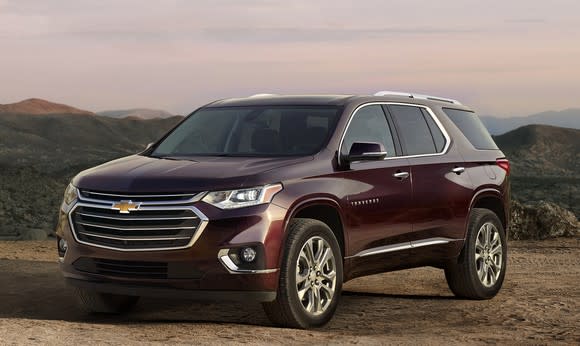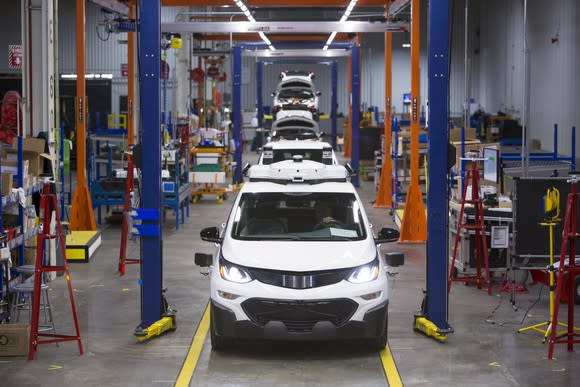1 Stock to Buy Now: General Motors
Most experts, including your humble Fool, agree that the auto industry is in the midst of what will likely be a wrenching transition from the old way of doing things (privately owned gas-burning cars and trucks), to a future built around electric drivetrains, autonomous-driving technology, and new shared-mobility business models enabled by technology.
That transition is why I think General Motors (NYSE: GM) is a buy right now. GM, more than other "legacy" automakers -- and more than any tech company -- is especially well-positioned for profit growth both now and after that transition is well under way.

GM's lineup of brand-new crossover SUVs, including the 2018 Chevrolet Traverse, are one key part of its profit-growth story. Image source: General Motors.
Why GM is an emerging profit-growth story
Even taken by itself, GM's legacy business of selling cars, trucks, and SUVs to individuals and fleets is a pretty good profit-growth story:
GM is posting fat profits on its well-regarded (and mostly brand-new) line of crossover SUVs.
It's about to launch all-new versions of its pickups and big truck-based SUVs, massive profit generators that are expected to be even more profitable in their new incarnations.
It's working on a global upgrade and expansion of its high-profit Cadillac luxury brand that should drive a significant increase in profits and margin over the next several years.
On top of that, CEO Mary Barra and her team have shut down or sold off unprofitable businesses in a serious effort to maximize return on invested capital over the long term.
Meanwhile, GM's tech efforts have put it in an excellent position to profit as the world changes:
GM is an electric-car leader. It beat Tesla (NASDAQ: TSLA) to market with the world's first affordable, long-range electric car, the Chevrolet Bolt EV, it's planning to launch at least 20 more all-electric vehicles over the next six years, and it promises that those electric vehicles will be solidly profitable. That's something that has eluded most rivals.
GM has staked out a leadership position in autonomous-driving technology, thanks to its San-Francisco-based software subsidiary, Cruise Automation. Cruise has developed a self-driving version of the Bolt that is ready for mass production as soon as its software is deemed to be consistently safer than a human driver -- likely in 2019.
As soon as the software is ready, those autonomous Bolts will be mass-produced by the thousands. But GM won't offer them to retail customers, at least at first: Those first self-driving Bolts will be used to provide an automated ride-hailing service in dense urban environments. That may happen via Lyft, in which GM owns a stake, via GM's wholly owned car-sharing subsidiary Maven, or both.
GM's future-tech efforts are what separate it (as an investment) from companies like Ford Motor Company (NYSE: F) or Honda (NYSE: HMC): Its technology is ahead, it's poised to profit from its future-tech sooner rather than later -- and it may be able to realize a significant first-mover advantage with its self-driving Bolts.

GM is ready to begin mass-producing self-driving Chevrolet Bolts as soon as its software is deemed ready for market. Image source: General Motors.
Why that adds up to significant profit growth over the next few years
Here's the key to the story: Unlike some "experts," GM doesn't believe that the transition from old to new will be an abrupt one -- and the case made by Barra and others makes a lot of sense.
It goes like this: GM thinks, as do many experts, that self-driving vehicles will catch on in some places (coastal cities) and in some niche applications fairly quickly. But at the same time, it thinks that the people and businesses in the center of the U.S. will continue to buy cars, trucks, and SUVs for many more decades.

Self-driving technology and privately owned vehicles may coexist for decades. If so, GM stands to profit substantially. Image source: General Motors.
The geographic distribution is significant. Those folks in the middle of the U.S. are the ones that currently buy the majority of GM's high-profit trucks and SUVs. While GM's vehicles will switch from gasoline to electric powertrains over time, the thinking is that the overall trends won't change a whole lot for at least several decades.
That point is important when thinking about GM as an investment: Barra and her team see the new self-driving businesses adding to GM's bottom line, rather than replacing existing profit. If they're right, and I think the case is strong, there's a good chance that GM's profit will grow significantly over the next decade or so.
Why the time to buy GM stock is now
Now is the time to buy because Wall Street is just starting to catch on to this story. GM's stock is up about 20% this year, but it's still trading at just seven times expected 2017 earnings. As GM's profit trajectory becomes clearer, that valuation -- as well as the overall stock price -- stands to rise.
That low valuation also means that GM's fairly modest (and sustainable) dividend looks quite good, yielding about 3.6%. It's a good deal for a company that could be a significant profit-growth story over the next several years -- and a major global mobility player for many decades.
More From The Motley Fool
6 Years Later, 6 Charts That Show How Far Apple, Inc. Has Come Since Steve Jobs' Passing
Why You're Smart to Buy Shopify Inc. (US) -- Despite Citron's Report
John Rosevear owns shares of Ford and General Motors. The Motley Fool owns shares of and recommends Ford and Tesla. The Motley Fool has a disclosure policy.
